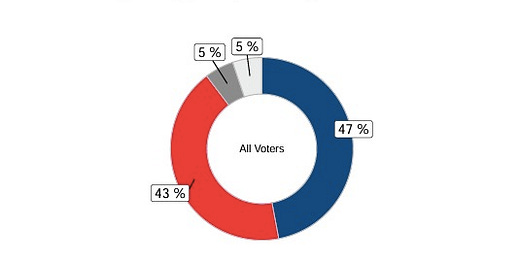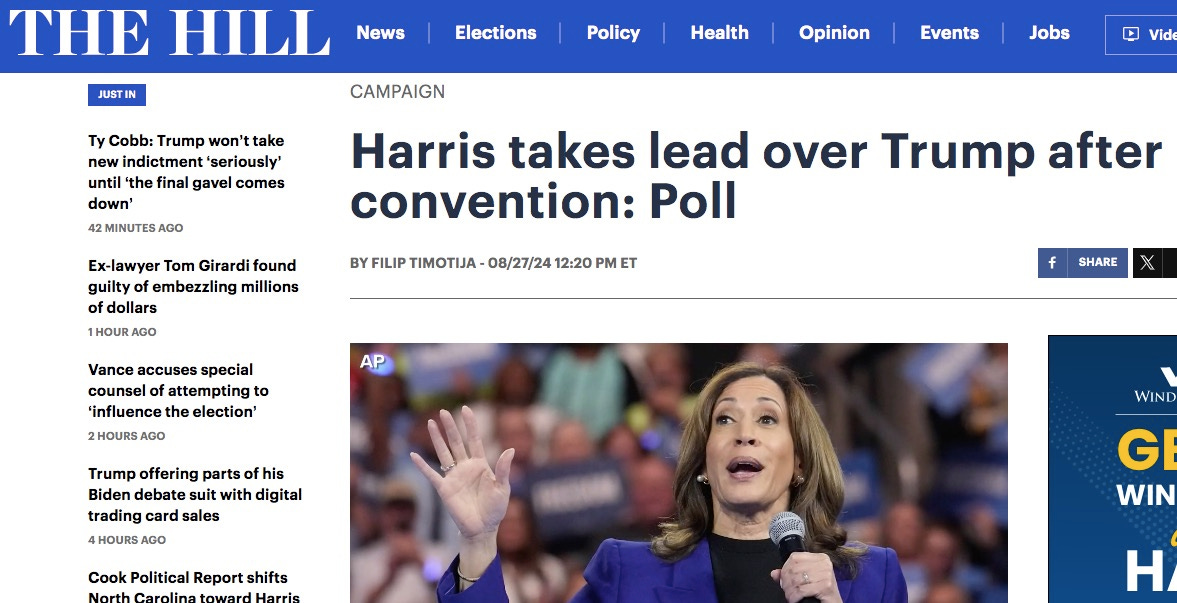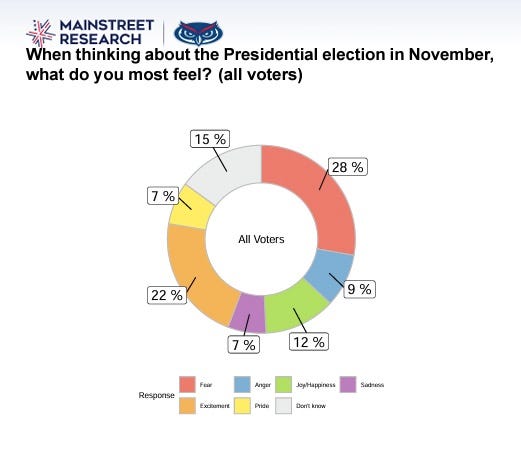The Ubiquitous "Public Opinion Poll" Doesn't Actually Measure Public Opinion
A majority of people could want an anti-establishment candidate as president and we would never know it because the public is never asked who they actually want.
Of all the ways the establishment manipulates the public during elections — disinformation from campaigns, media bias, ballot access restrictions, Big Tech manipulation, etc. — there’s one way that’s especially insidious and under-appreciated: Polling.
Polling is depicted as measuring public opinion, but the most prevalent polling question doesn’t actually ask the public their opinion.
Here’s a recent example of what I mean. The Hill just published a story: “Harris takes lead over Trump after convention: Poll” —
The Hill writes: “Vice President Harris has taken a 4-point lead over former President Trump in a nationwide poll released Tuesday, several days after the Democratic convention.
“The poll from Florida Atlantic University (FAU) Political Communication, Public Opinion Research Lab and Mainstreet Research USA found Harris leading Trump, 47 percent to 43 percent.” The story goes on to give a breakdown by gender, ethnicity, etc., for the millionth time.
If you do a bit of work and follow some links to find the actual question that’s asked, you eventually get to this PDF and you might be surprised to learn that the question isn’t “who do you want to be president?” which would seem to be the obvious query.
There are two problems: one obvious and one subtle but pivotal.
The obvious problem is that they don’t list the other candidates who are actually campaigning to win the presidency and have at least a theoretical chance of winning: Jill Stein of the Green Party and Chase Oliver of the Libertarian Party.
The other problem is the wording of the go-to question: “If the election for President were held today, and the candidates were Kamala Harris and Donald Trump, which candidate would you support?”
This question is a false hypothetical. The election isn’t being held today. Or tomorrow. Why ask it that way? It’s actually been done for decades. The obvious point of asking the question that way is to replicate the bind that voters are in when they step into the voting booth.
They are compelled to say they support Harris or Trump because they fear or hate the other.
Even if they actually want another candidate.
Susan Pinkus, then polling director of the Los Angeles Times when I raised this with her, once told me: “Who cares what they want? This is who they’re going to vote for.” Quite an attitude for a pollster, who presumably is supposed to care what the public thinks.
In the poll cited by The Hill, we have a university, which is supposed to do the work of understanding the world, a group called “Public Opinion Research Lab” and a group with “Mainstreet” in its name all obscuring our understanding of the opinion of Main Street.
Moreover, they are obscuring the actual preferences of the public to the public. By asking this question and not “who do you want to be president” they are not only obscuring the view of the public, they are then telling the public it thinks things it very well might not. The public is deprived of knowing its own mind.
A majority of people could want an anti-establishment candidate as president and we would never know it because the public is never asked who they actually want.
Pollsters are in effect limiting the choices of the public. Polls — which should be a method by which the public, rather than the parties or the pundits, articulates its desires — are crafted in such a way as to solidify the status of the “major candidates.” Then those polls are reported on over and over again, further canonizing the position of those candidates in the name of public opinion.
Citizens who might want to support an independent effort then hold back. A self-fulfilling prophecy comes to pass as the “major party” candidates tighten their grip on people who are often drawn to them by little more than their fear of the other “major party.” Breaking into the system is virtually impossible largely because pollsters have — consciously or not — incorporated the “greater evil” fear into the polls. A significant number of people may want an independent or “third party” candidate and we wouldn’t know it because the public isn’t asked.
One finding from the poll cited by The Hill hints at the underlying truth. When asked about how this presidential election makes them feel, the number one response was Fear. Perhaps the Harris “Joy” propaganda hasn’t kicked in sufficiently yet:
Followup:








They are manufacturing consent with limited choices & skewed results.. nice work Sam!
we're always wondering who they're even talking to! and yes, great job, Sam!! thanks always for your work and invaluable observations and analysis.